|
|
|
Sort Order |
|
|
|
Items / Page
|
|
|
|
|
|
|
| Srl | Item |
| 1 |
ID:
133711
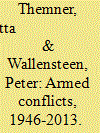

|
|
|
|
|
| Publication |
2014.
|
| Summary/Abstract |
In 2013, the Uppsala Conflict Data Program (UCDP) recorded 33 armed conflicts with a minimum of 25 battle-related deaths, up by one from 2012. Seven of these were recorded as wars, that is conflicts leading to 1,000 or more battle-related deaths in a calendar year. There have been 144 armed conflicts (47 wars) since 1989 and 254 armed conflicts (114 wars) since 1946. For the past ten years the amount of active armed conflict has fluctuated between 31 and 37. Six peace agreements were signed during the year 2013, two more than in the previous year. For the first time, this article also provides data on trends in battle-related deaths since 1989. These data do not show a clear time-trend. However, there is a particular difficulty in mapping the conflict in Syria, for which no credible battle-related deaths in 2013 can yet be reported.
|
|
|
|
|
|
|
|
|
|
|
|
|
|
|
|
| 2 |
ID:
133702
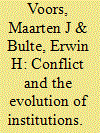

|
|
|
|
|
| Publication |
2014.
|
| Summary/Abstract |
The impact of armed conflict may persist long after the end of war, and may include a lasting institutional legacy. We use a novel dataset from rural Burundi to examine the impact of local exposure to conflict on institutional quality, and try to 'unbundle' institutions by distinguishing between three dimensions of the institutional framework: property rights security, local political institutions, and social capital. We find that conflict exposure affects institutional quality, and document that the impact of conflict on institutional quality may be positive or negative, depending on the institutional measure. Specifically, exposure to violence strengthens in-group social capital and promotes tenure security. However, the appreciation for state institutions is negatively affected by exposure to violence. We find no evidence consistent with design-based theories of institutional quality, or the idea that institutional quality is enhanced by interventions of (non)state external actors. Instead our findings provide some support for the theory of parochial altruism. Our results emphasize the importance for policymakers to consider autonomous responses to conflict when designing development programs. They further imply some caution for actors seeking to reform local institutions through top-down interventions.
|
|
|
|
|
|
|
|
|
|
|
|
|
|
|
|
| 3 |
ID:
133707
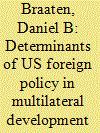

|
|
|
|
|
| Publication |
2014.
|
| Summary/Abstract |
The purpose of this study is to identify and explain recent US human rights policy in the Multilateral Development Banks (MDBs). Foreign aid, whether distributed directly (bilateral aid) or indirectly through multilateral institutions such as the MDBs, is one of several tools through which the USA furthers its human rights policy. Several studies show the conflicted human rights policies the USA pursues with bilateral aid, but very few examine the role of human rights in US multilateral aid policy. It is this deficit that the present study addresses by examining what factors determine how the USA votes on proposals before the Executive Board in the various MDBs. Using a multinomial logistic regression model I test whether US votes in the MDBs are conditioned on recipient countries' respect for human rights along with other strategic interest variables. The study finds that respect for political rights has an important role in determining US votes in the MDBs although much of the impact is accounted for by votes specifically against China. Conversely, respect for rights of personal integrity do not have an impact on US voting. Level of economic development and whether the country receives military aid from the USA are also important determinants of US votes, as well as the level of trade between the USA and the recipient country.
|
|
|
|
|
|
|
|
|
|
|
|
|
|
|
|
| 4 |
ID:
133706
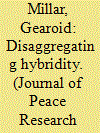

|
|
|
|
|
| Publication |
2014.
|
| Summary/Abstract |
The term 'hybrid' has been widely incorporated into recent peacebuilding scholarship to describe an array of peacebuilding endeavors, including hybrid peacekeeping missions, hybrid criminal tribunals, hybrid governance, and the hybrid peace. However, while widely deployed, hybridity itself is under-theorized and variably applied by scholars. Major concerns arise, therefore, concerning the concept's usefulness for peacebuilding theory, policy, and practice. Most problematically, while some scholars use hybridity descriptively to illustrate the mixing of international and local institutions, practices, rituals, and concepts, many today deploy hybridity prescriptively, implying that international actors can plan and administer hybridity to foster predictable social experiences in complex post-conflict states. This latter literature, therefore, assumes predictable relationships between the administration of hybrid institutions - of law, of governance, or of economics, for example - and the provision of peace-promoting local experiences of those institutions - experiences of justice, authority, empowerment, etc. This article argues that these assumptions are flawed and illustrates how a disaggregated theory of hybridity can avoid such errors. This theory distinguishes between four levels of hybridity - institutional, practical, ritual, and conceptual - characterized by their variable amenability to purposeful administration. The article illustrates how prescriptive approaches that assume direct and predictable relationships between institutions and experiences fail to recognize that concepts underpin local understandings and experiences of the world and, therefore, play a mediating role between institutions and experiences. Using examples from Sierra Leone, the article shows that while concepts are always hybrid, conceptual hybridity is inherently resistant to planned administration. As a result, internationally planned and administered hybrid institutions will not result in predictable experiences and may even result in negative or conflict-promoting experiences. The article illustrates the dangers of assuming any predictable relationships between the four levels of hybridity, and, therefore, between the administration of institutional hybrids and the predictable provision of positive local experiences.
|
|
|
|
|
|
|
|
|
|
|
|
|
|
|
|
| 5 |
ID:
133710
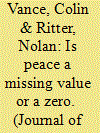

|
|
|
|
|
| Summary/Abstract |
Sample selection models, variants of which are the Heckman and Heckit models, are increasingly used by political scientists to accommodate data in which censoring of the dependent variable raises concerns of sample selectivity bias. Beyond demonstrating several pitfalls in the calculation of marginal effects and associated levels of statistical significance derived from these models, we argue that many of the empirical questions addressed by political scientists would - for both substantive and statistical reasons - be more appropriately addressed using an alternative but closely related procedure referred to as the two-part model (2 PM). Aside from being simple to estimate, one key advantage of the 2 PM is its less onerous identification requirements. Specifically, the model does not require the specification of so-called exclusion restrictions, variables that are included in the selection equation of the Heckit model but omitted from the outcome equation. Moreover, we argue that the interpretation of the marginal effects from the 2 PM, which are in terms of actual outcomes, are more appropriate for the questions typically addressed by political scientists than the potential outcomes ascribed to the Heckit results. Drawing on data from the Correlates of War database, we present an empirical analysis of conflict intensity illustrating that the choice between the sample selection model and 2 PM can bear fundamentally on the conclusions drawn.
|
|
|
|
|
|
|
|
|
|
|
|
|
|
|
|
| 6 |
ID:
133701


|
|
|
|
|
| Publication |
2014.
|
| Summary/Abstract |
Common notions about the source of communal land conflict in Africa have long explained it as growing out of conditions of environmental scarcity. This article argues instead that the institutional structure of the legal system is central to understanding which countries are prone to experience communal land conflict. When competing customary and modern jurisdictions coexist in countries inhabited by mixed identity groups, the conflicting sources of legal authority lead to insecurity about which source of law will prevail. Because the source of law is contested, conflict parties cannot trust the legal system to predictably adjudicate disputes, which encourages the use of extrajudicial vigilante measures. Using new data on communal violence in West Africa, this argument is examined for the period 1990-2009. The results show that in countries where competing jurisdictions exist, communal land conflict is 200-350% more likely. These findings suggest that researchers should consider the role of legal institutions and processes in relation to social unrest and collective violence
|
|
|
|
|
|
|
|
|
|
|
|
|
|
|
|
| 7 |
ID:
133703
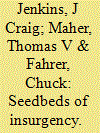

|
|
|
|
|
| Publication |
2014.
|
| Summary/Abstract |
Studies of insurgency and collective action are divided between structural and dynamic explanations. Structural theories address the presence of insurgency while dynamic theories focus on the frequency of insurgent actions. Yet prior studies often treat these arguments additively, leaving unclear how structural and dynamic processes affect these different aspects of insurgency. This study addresses this division by using zero-inflated negative binomial regression to examine in a single equation both the presence and the count of Islamist insurgency in Egyptian governorates between 1986 and 1999. We test political economy, moral economy, and cultural clash explanations of the presence of insurgency alongside political dynamics arguments about repression and exclusion to explain the count of attacks. Looking at the structural side of this equation, we find that communities with high rates of poverty, child mortality, cultural conservatism in terms of low contraceptive prevalence, and greater urban density are more likely to support insurgency. Looking at the dynamic side, parliamentary exclusion, security sweeps, and executions affect the count of attacks along with spatial diffusion from neighboring governorates. The culturally conservative region of Upper Egypt, which has a history of social and political marginality and opposition, provided a seedbed of insurgent support but this challenge broke down over time as repression intensified and exclusion was relaxed. These findings underscore the point that the presence of and the intensity of insurgency are distinct and driven by different factors. There are notable methodological and theoretical advantages to distinguishing between presence and count to better understand when and where insurgencies develop and their level of collective action.
|
|
|
|
|
|
|
|
|
|
|
|
|
|
|
|
| 8 |
ID:
133704


|
|
|
|
|
| Publication |
2014.
|
| Summary/Abstract |
We design an experiment to explore the impact of earned entitlements on the frequency and intensity of conflicts in a two-stage conflict game where players may attempt to use non-binding side-payments to avoid conflict. In this game, Proposers make offers and Responders decide simultaneously whether to accept the offers and whether to engage in a conflict. A simple theoretical analysis suggests that Proposers should never offer side-payments because Responders should always accept them and then still choose to enter conflict; however, our experiment reveals that some individuals use this non-binding mechanism to avoid conflict. Moreover, when subjects earn their roles (Proposer or Responder), conflicts are 44% more likely to be avoided than when roles are assigned randomly. Earned entitlements impact behavior in three important ways: (1) Proposers who have earned their position persistently make larger offers; (2) larger offers lead to a lower probability of conflict; but (3) Proposers whose offers do not lead to conflict resolution respond spitefully with greater conflict expenditure. Hence, with earned rights, the positive welfare effects of reduced conflict frequency are offset by higher conflict intensity. This result differs from previous experimental evidence from ultimatum games in which earned entitlements tend to encourage agreement and increase welfare; thus, our findings highlight the important consequences of endogenizing the costs of conflict. Our analysis suggests that earned entitlements alter behavior by influencing the beliefs of Proposers about the willingness of Responders to accept a peaceful resolution. As a result, these Proposers make persistent high offers, and when their beliefs are disappointed by a Responder's decision to accept a side-payment and still enter conflict, they retaliate.
|
|
|
|
|
|
|
|
|
|
|
|
|
|
|
|
|
|
|
|
|